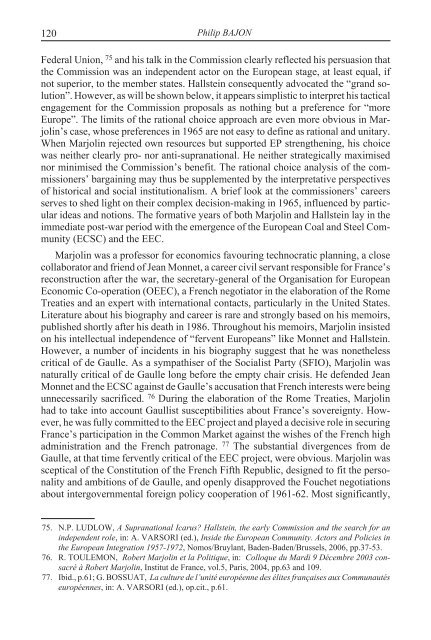Journal of European Integration History - Centre d'études et de ...
Journal of European Integration History - Centre d'études et de ...
Journal of European Integration History - Centre d'études et de ...
You also want an ePaper? Increase the reach of your titles
YUMPU automatically turns print PDFs into web optimized ePapers that Google loves.
120<br />
Philip BAJON<br />
Fe<strong>de</strong>ral Union, 75 and his talk in the Commission clearly reflected his persuasion that<br />
the Commission was an in<strong>de</strong>pen<strong>de</strong>nt actor on the <strong>European</strong> stage, at least equal, if<br />
not superior, to the member states. Hallstein consequently advocated the “grand solution”.<br />
However, as will be shown below, it appears simplistic to interpr<strong>et</strong> his tactical<br />
engagement for the Commission proposals as nothing but a preference for “more<br />
Europe”. The limits <strong>of</strong> the rational choice approach are even more obvious in Marjolin’s<br />
case, whose preferences in 1965 are not easy to <strong>de</strong>fine as rational and unitary.<br />
When Marjolin rejected own resources but supported EP strengthening, his choice<br />
was neither clearly pro- nor anti-supranational. He neither strategically maximised<br />
nor minimised the Commission’s benefit. The rational choice analysis <strong>of</strong> the commissioners’<br />
bargaining may thus be supplemented by the interpr<strong>et</strong>ative perspectives<br />
<strong>of</strong> historical and social institutionalism. A brief look at the commissioners’ careers<br />
serves to shed light on their complex <strong>de</strong>cision-making in 1965, influenced by particular<br />
i<strong>de</strong>as and notions. The formative years <strong>of</strong> both Marjolin and Hallstein lay in the<br />
immediate post-war period with the emergence <strong>of</strong> the <strong>European</strong> Coal and Steel Community<br />
(ECSC) and the EEC.<br />
Marjolin was a pr<strong>of</strong>essor for economics favouring technocratic planning, a close<br />
collaborator and friend <strong>of</strong> Jean Monn<strong>et</strong>, a career civil servant responsible for France’s<br />
reconstruction after the war, the secr<strong>et</strong>ary-general <strong>of</strong> the Organisation for <strong>European</strong><br />
Economic Co-operation (OEEC), a French negotiator in the elaboration <strong>of</strong> the Rome<br />
Treaties and an expert with international contacts, particularly in the United States.<br />
Literature about his biography and career is rare and strongly based on his memoirs,<br />
published shortly after his <strong>de</strong>ath in 1986. Throughout his memoirs, Marjolin insisted<br />
on his intellectual in<strong>de</strong>pen<strong>de</strong>nce <strong>of</strong> “fervent <strong>European</strong>s” like Monn<strong>et</strong> and Hallstein.<br />
However, a number <strong>of</strong> inci<strong>de</strong>nts in his biography suggest that he was non<strong>et</strong>heless<br />
critical <strong>of</strong> <strong>de</strong> Gaulle. As a sympathiser <strong>of</strong> the Socialist Party (SFIO), Marjolin was<br />
naturally critical <strong>of</strong> <strong>de</strong> Gaulle long before the empty chair crisis. He <strong>de</strong>fen<strong>de</strong>d Jean<br />
Monn<strong>et</strong> and the ECSC against <strong>de</strong> Gaulle’s accusation that French interests were being<br />
unnecessarily sacrificed. 76 During the elaboration <strong>of</strong> the Rome Treaties, Marjolin<br />
had to take into account Gaullist susceptibilities about France’s sovereignty. However,<br />
he was fully committed to the EEC project and played a <strong>de</strong>cisive role in securing<br />
France’s participation in the Common Mark<strong>et</strong> against the wishes <strong>of</strong> the French high<br />
administration and the French patronage. 77 The substantial divergences from <strong>de</strong><br />
Gaulle, at that time fervently critical <strong>of</strong> the EEC project, were obvious. Marjolin was<br />
sceptical <strong>of</strong> the Constitution <strong>of</strong> the French Fifth Republic, <strong>de</strong>signed to fit the personality<br />
and ambitions <strong>of</strong> <strong>de</strong> Gaulle, and openly disapproved the Fouch<strong>et</strong> negotiations<br />
about intergovernmental foreign policy cooperation <strong>of</strong> 1961-62. Most significantly,<br />
75. N.P. LUDLOW, A Supranational Icarus? Hallstein, the early Commission and the search for an<br />
in<strong>de</strong>pen<strong>de</strong>nt role, in: A. VARSORI (ed.), Insi<strong>de</strong> the <strong>European</strong> Community. Actors and Policies in<br />
the <strong>European</strong> <strong>Integration</strong> 1957-1972, Nomos/Bruylant, Ba<strong>de</strong>n-Ba<strong>de</strong>n/Brussels, 2006, pp.37-53.<br />
76. R. TOULEMON, Robert Marjolin <strong>et</strong> la Politique, in: Colloque du Mardi 9 Décembre 2003 consacré<br />
à Robert Marjolin, Institut <strong>de</strong> France, vol.5, Paris, 2004, pp.63 and 109.<br />
77. Ibid., p.61; G. BOSSUAT, La culture <strong>de</strong> l’unité européenne <strong>de</strong>s élites françaises aux Communautés<br />
européennes, in: A. VARSORI (ed.), op.cit., p.61.

















